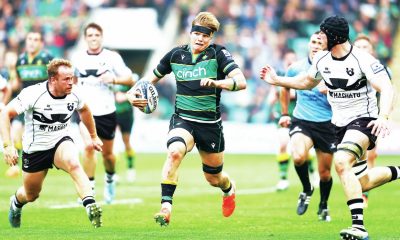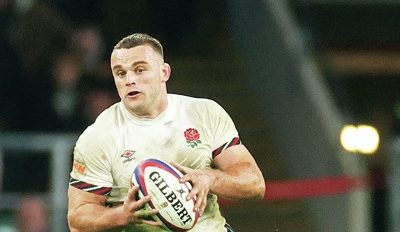 Heyneke Meyer knows that ultimately his reign as Springbok coach will be defined not on whether he produces a South Africa team with thrills, frills, and spills, but one which keeps winning. He knows, too, that if his tenure is to be a success, rather than a slow death by a thousand cuts, he simply has to beat England in the three-Test series that kicked off at King’s Park, Durban, yesterday – and he has stated clearly that if he deems that the best way to achieve it is to play a style of rugby that bores the pants off the capacity crowds who watch the Tests, then that is what he will do.
Heyneke Meyer knows that ultimately his reign as Springbok coach will be defined not on whether he produces a South Africa team with thrills, frills, and spills, but one which keeps winning. He knows, too, that if his tenure is to be a success, rather than a slow death by a thousand cuts, he simply has to beat England in the three-Test series that kicked off at King’s Park, Durban, yesterday – and he has stated clearly that if he deems that the best way to achieve it is to play a style of rugby that bores the pants off the capacity crowds who watch the Tests, then that is what he will do.
Meyer’s win-at-all-costs mantra was set out not long after he was named as successor to Peter De Villiers, when he said: “There are only two kinds of rugby – winning rugby and losing rugby. Great defence and great competing will always beat a free-flowing game, and people never remember how you win, it’s whether or not you win.”
Meyer is an Afrikaaner to the soles of his ‘veldskoen’ (Afrikaaner walking shoes), and is well aware that with South African rugby split along tribal and regional lines, he will never please all Springbok fans all of the time. His long and successful association with the Bulls — the Pretoria-based side whom he coached to become the first South African side to win the Super 14, as well as win four Currie Cup titles – means that a certain amount of distrust and discord is unavoidable, especially with supporters from the Durban-based Sharks and Cape Town-based Stormers.
Those suspicions were sharpened when Meyer appointed his back-up coaching staff en bloc almost entirely from the Bulls, with the former Saracens hooker John McFarland (defence) joined by Johan van Graan (forwards) and Ricardo Loubscher (backs). Added to that, when I made landfall in Durban a couple of days before the first Test the city on the shores of the Indian Ocean was buzzing angrily with the news that the new Bok coach had favoured the Bulls full-back, Zane Kirchner, over local hero Pat Lambie, for the No.15 jersey.
Lambie, 21, has been dubbed the ‘Boy Wonder’ by Sharks fans on account of his silky skills and dazzling footwork and the decision to go with the physically strong but less exciting Kirchner was seen as a call to arms in Natal, which proudly refers to itself as ‘The Last Outpost of the British Empire’. They saw it as clear evidence that Meyer is an arch-conservative who will favour Bulls players, and who is as inflexible in his thinking about players as he is about his forward dominated, defence dominated, kick-chase tactics.
 During Meyer’s brief stint at Leicester before family matters forced him to return home he outlined his man-management philosophy to me.
During Meyer’s brief stint at Leicester before family matters forced him to return home he outlined his man-management philosophy to me.
“I am a believer in psychometric and psychological tests so you know which buttons to press with each player, and it takes time to get people’s trust. I believe you have to handle each player differently, but there are certain things that are non-negotiable for me. That is discipline, and that the team always comes first. I do not believe in prima donnas or superstars. I am big on the culture of guys playing for each other, but not big on the celebrity type of player that just plays for himself and tries to get into the England set-up, or wherever. I am a big believer in the team, and guys being mentally tough and playing for each other. I don’t care how good a player he is, if he does not fit that mould then he will not play for me.”
Meyer developed a system with the Bulls where he rated player potential in five different categories: power, explosiveness, speed, skill and mental toughness, with a player’s resolve in the face of gruelling physical demands carefully monitored. Average to good in all five categories was not good enough for Meyer, and he rejected players who were all-rounders but did not have the added extra. Of all the essential qualities mental toughness rated highest on Meyer’s chart, but just how high he sets his standards is that it was not enough to win his approval unless the player also excelled in two other categories – and was good, or coachable, in the remaining two.
The overall picture of Meyer is one of a coach who is strong, ruthlessly determined, and inflexible. The big question is whether he can transfer a successful template with the Bulls, which took time to develop week-in week-out during his eight year coaching tenure at Loftus Versfeld, across to the intense, high pressure, but essentially part-time international arena?
Test rugby requires flexibility from a coach, as well as great judgement, and Meyer’s decision to axe Heinrich Brussouw, his best openside ‘fetcher’, not just from the starting 22 but from the entire 32-man Test squad, left many Springbok supporters scratching their heads.
So did his inclusion of only three Stormers players, despite them being the leading South African side in the Super 15, with the excluded Gio Aplon one of their star turns.
Meyer’s call to make Jean de Villiers his first captain was also snared in rumours that he was a default choice after Fourie du Preez rejected the offer of the captaincy, and there were question marks over his decision to select the Stormers veteran at outside centre, letting Frans Steyn bump him from his customary position at inside centre.
Meyer told me when he was at Leicester that he considers building a happy team to be of paramount importance. He said, “A lot of players at the Bulls came to me with whatever problems they had, and it built such a strong relationship that, to put it bluntly, when they went on the field they would have died for me. It takes time to build that…but I believe that 80 per cent of coaching is off-the-field, and that if you create the right environment then the trophies will come. Most people do not remember who won a trophy 10 years back – what’s more important to me when I finish is that I made a difference to people’s lives. A happy team wins trophies.”
There were more than a few unhappy players and fans out there after Meyer’s first round of decision-making, and whatever happens against England in this series, the new Springbok coach has got a hell of job on his hands to build a happy team from all the discordant, feuding fiefdoms that make up South African rugby.

1 Comment
You must be logged in to post a comment Login
Leave a Reply
Cancel reply
Leave a Reply
You must be logged in to post a comment.

Champions Cup
Bordeaux Begles accused of Henry Pollock vendetta

English Championship
Ryan Lamb support for Championship changes
Latest News
Great Britain to cut its sevens project

Latest News
Call for concussion protocols to be revised






















Pingback: Belcampo Anya Fernald scandal